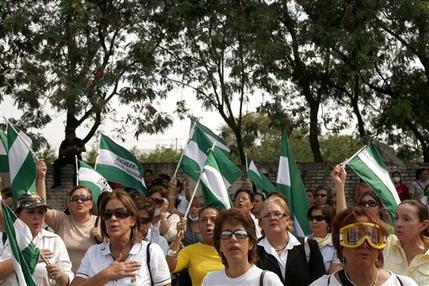
(above) Opponents to Bolivia's President Evo Morales' government protest against Venezuela's President Hugo Chavez in front of his country's consulate in Santa Cruz, Bolivia, Friday, Sept. 12, 2008. Morales said Friday he sent a letter to opposition governors inviting them to dialogue, after violent protests exploded in Bolivia's pro-autonomy east, killing at least 8 people. Chavez said Thursday his government will back Morales militarily if necessary. (AP Photo/Dado Galdieri)
Bolivia's crisis highlights US neglect in region
September 12, 2008 - Associated Press
By FRANK BAJAK, Associated Press Writer
BOGOTA, Colombia (AP) -- Latin America's leaders rallied around Evo Morales on Friday as Bolivia's president fought to keep his Andean nation whole, but few backed his claim that Washington was inciting the unrest.
Only Venezuela's pugilistic president, Hugo Chavez, matched Morales by booting an American ambassador.
The region's response to this week's upheaval in Bolivia evinces feelings rather that Washington, the traditional power broker in the Americas, has largely abandoned it.
There is, above all, a sense that it's up to South America to keep Bolivia from breaking apart - even if it's not clear how.
Yet few of the regional leaders' messages of support for Morales have echoed the anti-American rants of Chavez.
Both men blame a conspiracy of "oligarchs" and U.S. imperialists for escalating anti-Morales violence though without providing evidence. The U.S. denies it's trying to oust Morales.
President Alan Garcia of Peru, whose constant quarrels with Morales and Chavez's "21st-century socialism" have occasionally devolved into insults, was among Latin leaders backing the Bolivian leader on Friday.
Garcia told reporters in Lima on Friday that he opposes "any separatist effort to break the integrity of nations."
His guest, leftist President Rafael Correa of Ecuador, sent Morales "a big hug" and reminded journalists of the Bolivian president's impressive 67 ratification percent vote in an Aug. 10 recall referendum.
Brazil came out swinging against the idea of Morales being overthrown by wealthy landed gentry more sympathetic to the United States than to their first indigenous president.
Brazil "will not tolerate a rupture in Bolivia's democratic order," Presidential aide Marco Aurelio Garcia said.
Honduran President Manuel Zelaya announced Friday that he was delaying receiving the credentials of a new U.S. ambassador in solidarity with Morales.
Argentina, Colombia and Brazil - whose center-left president, Luiz Inacio Lula da Silva, has emerged as a strong counterbalance to Chavez - have been trying in vain to mediate in Bolivia.
Two-week-old protests organized by Morales' pro-autonomy opponents in Bolivia's natural gas-rich eastern provinces have escalated dangerously.
Eight people were killed Thursday in a clash between Morales' backers and opponents. The violence followed the sacking earlier in the week of government offices and seizures of natural gas fields that for two days curtailed gas flows to Brazil by 10 percent.
Morales ordered the military to restore control of the gas fields. But he has largely lost control of Bolivia's four eastern provinces, whose leaders are fighting with him over gas revenues and a proposed new constitution.
Morales has called a Dec. 7 nationwide referendum on the new constitution, which would consolidate his efforts to favor the country's long-suppressed indigenous majority and help him redistribute unproductive large estates to landless peasants.
While the government decries alleged U.S. intervention, many Bolivians are incensed by Chavez's influence, and accuse Morales of acting on the advice of Venezuelan advisers. They also decry the tens of millions of dollars in aid from Caracas.
Sensitivity to foreign meddling - U.S. or otherwise - is profound, as exhibited Friday by Bolivian armed forces chief Gen. Luis Trigo, who has shown nothing but loyalty to Morales.
In response to Chavez's pledge a day earlier to intervene militarily if Morales were overthrown, Trigo responded, "We will not permit any foreign military force to set foot on national territory."
It would be a big mistake to see Latin America's left as a monolith slavishly following Chavez, who many consider a threat to regional stability.
Ecuador, for example, has refused to join ALBA, the Chavez-conceived socialist trading alliance that includes Bolivia, Cuba, Nicaragua - and now Honduras.
Other Chavez-related concerns include his weapons purchases from and growing military ties to Russia, which sent two long-range Tupolev bombers for a friendly visit this week and is planning naval exercises with Venezuela in November.
"South America hasn't been a place of confrontation between the great powers since the 1970s and '80s. Could that now be changing?" asked Alexandre Barros, a Brazilian political analyst.
If so, it would be poison for the economic integration that South America's leaders have been discussing in hopes of one day creating something similar to the European Union.
Such a union would directly challenge U.S. commercial interests in the region, even though those interests are diminishing slowly anyway as Chinese, Indian and other foreign companies invest in the continent's mineral riches and buy huge amounts of commodities including iron ore and soy.
Even Washington's friends in the region have bitterly decried a general U.S. neglect that followed the Sept. 11, 2001 attacks- with the exception of Colombia where close U.S. cooperation has helped a right-wing government throw the hemisphere's last major rebel army into disarray.
The general power vaccum hasn't made life easy for Philip Goldberg, the U.S. ambassador ordered expelled by Bolivia this week.
Goldberg was briefly recalled to Washington after Morales' supporters learned in June that a former defense minister wanted for extradition in the killing of at least 60 protesters in October 2003 was quietly granted U.S. political asylum a year ago and was living in Florida.
Thousands marched on the U.S. Embassy in La Paz to register their anger - and were applauded by Morales.
© 2008 The Associated Press. All rights reserved. This material may not be published, broadcast, rewritten or redistributed. Learn more about our Privacy Policy.